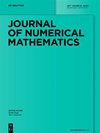对流-扩散-反应方程代数稳定离散化解的评估
IF 4
2区 数学
Q1 MATHEMATICS
引用次数: 2
摘要
我们考虑了三维对流主导输运问题的通量校正有限元离散化,并评估了基于这种近似的算法的计算效率。正在研究的方法包括通量校正输运方案和单片限制器。我们使用连续伽辽金方法和本文章由计算机程序翻译,如有差异,请以英文原文为准。
An assessment of solvers for algebraically stabilized discretizations of convection–diffusion–reaction equations
Abstract We consider flux-corrected finite element discretizations of 3D convection-dominated transport problems and assess the computational efficiency of algorithms based on such approximations. The methods under investigation include flux-corrected transport schemes and monolithic limiters. We discretize in space using a continuous Galerkin method and ℙ1 or ℚ1 finite elements. Time integration is performed using the Crank–Nicolson method or an explicit strong stability preserving Runge–Kutta method. Nonlinear systems are solved using a fixed-point iteration method, which requires solution of large linear systems at each iteration or time step. The great variety of options in the choice of discretization methods and solver components calls for a dedicated comparative study of existing approaches. To perform such a study, we define new 3D test problems for time dependent and stationary convection–diffusion–reaction equations. The results of our numerical experiments illustrate how the limiting technique, time discretization and solver impact on the overall performance.
求助全文
通过发布文献求助,成功后即可免费获取论文全文。
去求助
来源期刊
CiteScore
5.90
自引率
3.30%
发文量
17
审稿时长
>12 weeks
期刊介绍:
The Journal of Numerical Mathematics (formerly East-West Journal of Numerical Mathematics) contains high-quality papers featuring contemporary research in all areas of Numerical Mathematics. This includes the development, analysis, and implementation of new and innovative methods in Numerical Linear Algebra, Numerical Analysis, Optimal Control/Optimization, and Scientific Computing. The journal will also publish applications-oriented papers with significant mathematical content in computational fluid dynamics and other areas of computational engineering, finance, and life sciences.

 求助内容:
求助内容: 应助结果提醒方式:
应助结果提醒方式:


